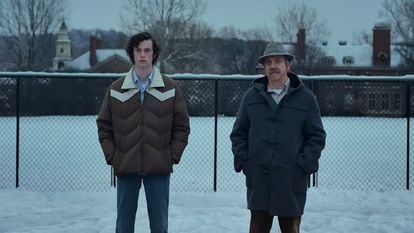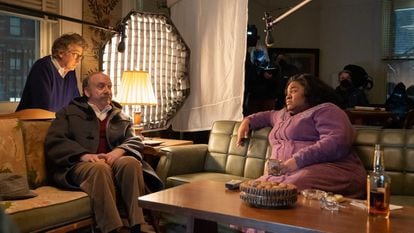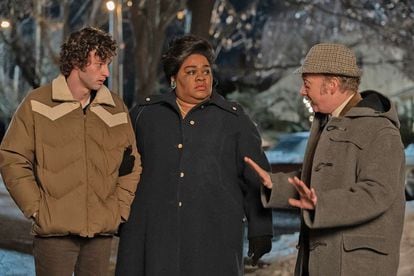When he was a child, Alexander Payne, now 62, dreamed of turning into a projectionist. “And have a look at me now,” he jokes by video name days earlier than Christmas from his house in his native Omaha, Nebraska. The 2-time Oscar winner for the screenplays of Sideways and The Descendants —and recipient of 4 different nominations, two in directing and two in screenwriting for Election and Nebraska — is a type of choose filmmakers who can do no matter they need. “Nicely, I transfer in medium-sized budgets, I’m not very prolific…. That helps, however I want I had been sooner,” he confesses. “I respect good cinema an excessive amount of to do something. Though… there’s a sure pretentiousness in making an attempt to not be pretentious. I plead responsible.”
The dialog comes amid Oscar buzz for his newest film, The Holdovers, the story of three characters within the midst of life crises and discover themselves alone and aimless one Christmas within the early Nineteen Seventies at a New England boarding faculty: a trainer of historical historical past, a wayward scholar and the prepare dinner, who has simply misplaced her son within the Vietnam Conflict. Two of the lead actors, Paul Giamatti, who performs the trainer, and who grew to become well-known twenty years in the past for Payne’s Sideways, and Da’Vine Pleasure Randolph, who performs the prepare dinner, received Golden Globes final Sunday. On January 23, when the Oscar nominations are introduced, The Holdovers might be nominated in no less than 5 classes. “One step at a time, please, one step at a time,” Payne says. On Wednesday, Payne was one among 5 administrators nominated for the Administrators Guild Awards.

Though he has solely directed eight function movies, Payne usually works concurrently on numerous phases of his initiatives. The Holdovers grew out of a screening on the 2011 Telluride Movie Competition, the place Payne noticed Marcel Pagnol’s 1935 basic Merlusse. “There’s the story of the professor with a watch downside. [Anyway,] it was the premise, not the seed. As a result of years later I acquired a script for a pilot episode from David Hemingson, who I didn’t know, that had a narrative just like that one, and I referred to as him up and challenged him, ‘What should you rewrote it as a film?’ And he agreed. Credit score to him,” Pyne explains. How did they resolve what period to set it in? “The Nineteen Fifties is Peter Weir territory [The Dead Poets Society]. And these days there are not any unisex faculties and too many cell telephones.” That’s why they stayed within the Nineteen Seventies, at a time of political and social modifications, the echoes of which transpire within the story. “That’s how we arrived at the necessity to make it as if we had been in 1970, from the credit to the digicam actions. I assumed it might be enjoyable, it might make it fascinating. A decade in the past, I used to be already on the lookout for one thing particular by taking pictures Nebraska in cinemascope and black and white. The important thing was that we shot it not as if it had been a interval function, however as if we had been working in 1970, on a recent movie. It was a radical expertise.”
I grew up watching films from the Nineteen Seventies, earlier than studio cinema acquired screwed up.”
Within the Nineteen Seventies, the world appeared to reside in a human dimension; it was earlier than expertise swept the Earth. In Payne’s cinema, the human being takes priority. “I don’t know tips on how to strategy this topic with out screwing up. I’m not the one filmmaker who thinks about displaying folks earlier than strolling clichés, or nice particular results…. There are fewer and fewer of us, I notice. Sure, I’m involved in folks.”

Payne doesn’t like to speak about himself as an individual or about his cinema; as a substitute, he pushes the dialog towards different creators and their movies. Nonetheless, his credo peeks out. “As a toddler I used to be impressed by Trendy Instances. Then, [when he was studying abroad] in Salamanca, Spain, as a result of the censorship was lifted and it had not been launched in Spain, I noticed La dolce vita. And, above all, I found Viridiana. I by no means thought a movie might be so lovely and subversive.” Upon his return to San Francisco, Payne attended the screening of a restored copy of The Seven Samurai. “I made a decision I might attempt to examine movie, extra out of my ardour as a viewer than artistic drive. I assumed, ‘I’ll by no means climb a mountain that top, however I need to be on that mountain.’ And I’ve repeated that phrase to myself quite a few instances in my life. It doesn’t matter if the result’s failure, what issues is making an attempt issues.”
The novel all the time wins on factors, whereas the story should triumph by Okay. O. Nicely, the identical is true of a movie: it has to win on factors.”
Throughout his shoots, on Friday nights the crew will get collectively, drinks martinis and watches movies that Payne screens: “On this event I confirmed The Graduate, Klute, Paper Moon, The Landlord, Harold and Maude and The Final Element.” The final three had been directed by Hal Ashby. “I like him quite a bit. Particularly his seven works from the Nineteen Seventies, a decade that ended with Being There… I additionally just like the movies of Mike Nichols and Carlos Saura from that point.”
Payne belongs to a technology of American filmmakers who admit to being heirs of New Hollywood cinema, together with Paul Thomas Anderson, Jeff Nichols, James Grey and David O. Russell. “[That’s] most likely as a result of we’re of comparable ages and grew up watching these movies, earlier than studio cinema acquired screwed up. Adolescence is the time that marks your character. The coed character was very fascinating to me as a result of he’s on the finish of that interval, he’s going to take a leap and his life can change radically.”

Because of his freedom, Payne has not wanted to work beneath any platform’s inflexible scheme that forces these WTF [What The Fuck?] moments described by Nanni Moretti in A Brighter Tomorrow. “I do what I need to do. I’ve by no means shot something towards my will. Though proper now I’ve three scripts in hand, I think I’ll go for a western written by Hemingson [he ponders for a few seconds in silence with his head down]. Are you aware how I’m privileged? In that I’m directing movies at a time when moviegoers nonetheless go to theaters, and mankind had gone for hundreds of years with out inventing cinema!” He returns to present narrative patterns: “It’s clear to me that each story is totally different, however above all they’re like life. Bittersweet. There will likely be highs and lows. And people WTF plot twists don’t normally occur in minute three. That’s why I care about endings, and I don’t make them completely happy or heavy, as a result of I care concerning the feeling with which the viewers leaves the theater. Julio Cortázar stated that writing is sort of a boxing match. The novel all the time wins on factors, whereas the quick story should triumph by knockout. Nicely, the identical is true of a movie: it has to win on factors.”
Join our weekly publication to get extra English-language information protection from EL PAÍS USA Version

/cloudfront-eu-central-1.images.arcpublishing.com/prisa/XRIYXEVD6BDHTJEL5R57EWAYVA.jpg)